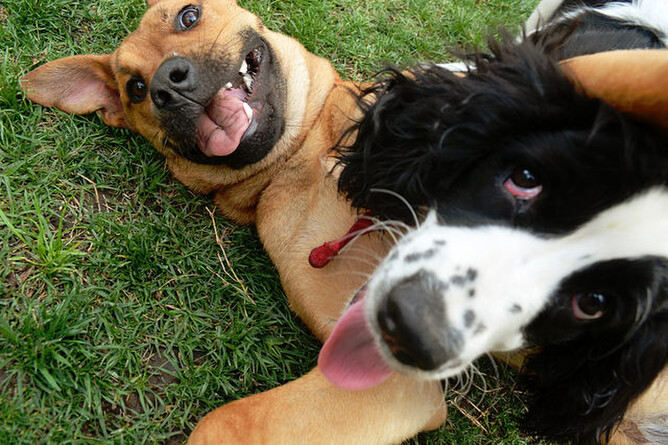Learn how and when to socialise your pooch
Everyone wants a happy pooch; confident, sociable, and with lots of friends to play with. So what do you do when, for whatever reason, your pooch just doesn’t seem to fit in?
Whether you have a puppy that needs to learn how to mingle or a rescue dog that needs some encouragement, as a parent you have a responsibility for socialising your dogs.
But it can be hard to know just how to go about this. That’s why we’ve compiled a list of some of our top tips to help with dog and puppy socialisation.
The longer you leave socialising dogs, the harder it gets.
The prime age for encouraging social behaviour is between 3 and 12 weeks, when their personalities are still somewhat adaptable and they’re more accepting of new or uncomfortable experiences. During this period you should expose your puppy to as many new experiences and situations as you can.
Beyond 18 weeks it gets much more difficult, but it is still possible.
1. Start small
For really nervous dogs or timid puppies, start with small steps and gradually build up.
Invite dog-savvy friends round that will know how to act, and ensure there are lots of treats and toys around so that your dog will equate strangers with positive things. Start with only a few people at a time and as confidence rises, increase this.
Likewise, to begin with at the dog park, keep them on the leash or let them observe through the fence. When they are ready you can begin integrating them with the other dogs and eventually allow them to roam free. Rushing straight in can end up making them even more scared.
2. Daily walks
Daily walks are essential for socialising dogs.
They are the best way to introduce your dog to the world and get them to become comfortable with new environments and other dogs and humans. If they’re really shy, try going during weekdays when there will be less people around.
Taking varied routes during these walks is crucial for puppy socialisation as it gives your pup the opportunity to meet lots of different canine and human friends and to experience new sights, smells and sounds.
3. Mix it up
Just as you should mix up your walking routes, it’s important to introduce your pups to lots of different kinds of experiences and situations.
Familiarise them with everything you can (as early on as you can):
- Small dogs and big dogs
- Traffic
- Children
- Thunder
- Lightning
- Bikes
- Trains
- Fireworks
- Obscure things: plastic bags/elevators
4. Reward social behaviour
Encourage positive social habits with treats and praise. In this way, you aid the association of social behaviour with good things. When your dog plays or acts well in public, give him treats and love and let him know you approve of this behaviour.
Similarly, do not encourage anti-social behaviour. If your dog barks or shows fear, rather than petting and soothing or even getting angry and shouting (which they may then start to associate with this behaviour) walk away and wait for them to calm down or use a gentle correction signal.
5. Dog classes
If you are really struggling, or feel an outside hand could help, look for some obedience or puppy socialisation classes. These teach behavioural techniques in a safe environment, and can be a great way to meet other like-minded owners and their pups.
As with any tips concerning your dogs, use your judgement to work out what will work best for yours.
Some experiences will be too overwhelming, particularly for puppies, and can end up doing more harm than good. Think twice before introducing your chihuahua to a great dane, and vice versa (at least to begin with!)
Watch and respond to your dog's behaviour to see how they are feeling about a situation. If she seems to have had enough or is looking scared, leave and try again another time.
7. Neutral spaces
For introductions, try to use neutral spaces like a park or friends home. It’s best not to introduce your dog to another dog in your own backyard as this is his territory and it may make him act aggressively.
8. Keep them safe with a muzzle
If you know your dog growls or bites when around other dogs, begin by using a muzzle in social situations. This takes the pressure off the experience; you don’t need to worry about the dogs hurting each other and both dogs can approach the meeting in a much calmer and gentler way.
Further questions about how to get your particular pup to socialise? Don’t hesitate to contact us on 09 448 2227 or come in store, where you’re sure to meet other dogs!




